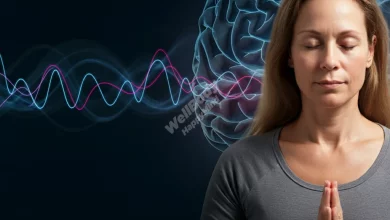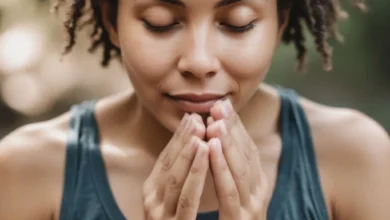Self-Awareness Guide: Simple Steps to Start Today

Self-awareness is knowing yourself, your thoughts, and your feelings. It is about understanding why you act in certain ways. Self-awareness helps us make better choices, handle stress, and connect with others. It is key to mental wellness and personal growth.
Maybe you have felt overwhelmed by emotions or unsure of your actions. You are not alone. Many people want to understand themselves better. Becoming more self-aware can help you feel more in control. It can make you happier and more at peace.
In this guide, you will discover simple, effective ways to grow your self-awareness. These mindful steps will help you start your journey today.
Understanding Self-Awareness: A Foundation for Personal Growth

Self-awareness is simply paying attention to yourself. It means noticing your thoughts, feelings, and actions. There are two types: internal and external.
- Internal self-awareness is about understanding what is happening inside you. It includes your thoughts, emotions, and values. For example, noticing when you are feeling angry or joyful.
- External self-awareness is about seeing how others see you. It means understanding how your actions affect others. For example, realizing that your tone might come across as unfriendly.
Developing both types helps you grow as a person. It allows you to understand and control your reactions.
Benefits of Self-Awareness:
- Better emotional control: You notice your feelings before they get too intense.
- Improved relationships: You understand others better and can respond with empathy.
- Greater happiness: Knowing yourself leads to choices that make you happier.
- Less stress: Recognizing what triggers stress helps you manage it better.
Key Benefit: Self-awareness helps you handle emotions calmly and respond wisely.
Key Benefit: Understanding yourself leads to stronger, more positive relationships.
Self-awareness is the first step to changing patterns that do not serve you. It is the foundation for personal growth and mindfulness. The good news? Anyone can learn it, with the right practice.
The Mind-Body Connection in Self-Awareness

Our physical sensations and emotions are closely linked. Sometimes, your body reacts before your mind realizes what is happening. For example, a tight chest might mean you are feeling anxious. Noticing these physical signs helps you understand your emotions better.
One powerful tool for this is the body scan technique. It is a simple mindfulness practice that involves focusing on different parts of your body. You notice any tension, pain, or sensations without judgment.
Breath awareness is also helpful. Your breath reflects your emotional state. Fast, shallow breaths may signal stress, while slow, deep breaths can help calm you. Paying attention to your breath helps you stay in tune with your feelings and relax when needed.
Tip: Practice body scanning and breath awareness daily to connect your mind and body.
Simple Body Scan Exercise for Beginners
Try this body scan exercise to start building self-awareness. It takes about 10 minutes:
- Find a quiet spot where you can sit or lie down comfortably.
- Close your eyes and take a few deep breaths.
- Focus on your feet. Notice any sensations—warmth, tingling, or tension.
- Slowly move your attention up through your legs, stomach, chest, arms, and head.
- Pause at each area. Notice what you feel without trying to change it.
- Finish with a few deep breaths. Open your eyes when ready.
This simple exercise helps you notice what is happening in your body. It brings your attention to the present moment and helps you understand your emotions better.
Tip: Start with 5 minutes and gradually increase the time as you get more comfortable.
Daily Mindfulness Practices to Build Self-Awareness

Building self-awareness takes regular practice. Here are some simple daily mindfulness practices that can help:
- Morning check-ins: Spend 5 minutes each morning checking in with yourself. Notice how you feel and what thoughts are on your mind. This sets a positive tone for the day.
- Mindful eating: Pay full attention to your meal. Notice the taste, texture, and smell of your food. Eating mindfully helps you stay present and connected to your body.
- Walking meditation: Go for a short walk and focus on each step. Feel your feet touching the ground. Notice your surroundings—sights, sounds, and smells. This practice calms your mind and grounds you.
- Journaling prompts: Write down your thoughts and feelings each day. Use prompts like, “What am I feeling right now?” or “What made me happy today?” Journaling helps you explore your inner world.
- Evening reflection: Before bed, take a few minutes to reflect on your day. What went well? What emotions did you feel? Reflecting helps you learn more about yourself and make better choices.
These simple practices fit easily into your day. They help you build self-awareness over time, one small step at a time.
Tip: Start with one or two practices and add more as you get comfortable.
Common Obstacles to Self-Awareness and How to Overcome Them
Developing self-awareness can be challenging. Here are some common obstacles and strategies to overcome them:
| Obstacle | Solution |
|---|---|
| Busy schedule | Set aside 5-10 minutes each day for reflection. |
| Fear of emotions | Start small. Notice feelings without judgment. |
| Overthinking | Focus on the present moment. Practice grounding. |
| Negative self-talk | Replace negative thoughts with kind statements. |
| Lack of routine | Create a schedule. Add mindfulness to daily habits. |
Facing obstacles is part of the journey. The key is to be patient with yourself and keep practicing. Over time, you will notice improvements in your self-awareness.
Tip: Start with small, manageable steps to overcome obstacles and build your practice.
Creating Your Personal Self-Awareness Journey
To develop self-awareness, it is important to set realistic expectations and create a routine. Here are some tips to help you create your personal journey:
- Set realistic goals: Start small. Aim to practice mindfulness for a few minutes each day. As you get comfortable, increase the time and try different techniques.
- Establish a routine: Consistency is key. Add mindfulness practices to your daily schedule. Whether it is in the morning, during lunch, or before bed, find a time that works for you.
- Track your progress: Keep a journal to record your experiences. Write about your feelings, thoughts, and any changes you notice. Tracking progress helps you see how far you have come and keeps you motivated.
Tip: Celebrate small wins along the way. Every step forward is progress.
Sample 7-Day Self-Awareness Challenge
Here is a 7-day self-awareness challenge to help you get started:
Day 1: Spend 5 minutes in the morning checking in with yourself. Notice your thoughts and feelings.
Day 2: Practice mindful eating during one meal. Pay attention to the taste, smell, and texture of your food.
Day 3: Go for a walking meditation. Focus on each step and notice your surroundings.
Day 4: Write in your journal about what made you happy today. Reflect on your feelings.
Day 5: Try the body scan exercise for 10 minutes. Notice sensations in your body.
Day 6: Replace negative self-talk with kind statements. Write down one positive thing about yourself.
Day 7: Spend 10 minutes in evening reflection. Reflect on your day and notice any emotions you felt.
This challenge helps you build self-awareness gradually. Each day focuses on a simple practice that brings you closer to understanding yourself better.
Tip: Repeat the challenge as often as you like to deepen your self-awareness journey.
Advanced Practices for Deeper Self-Awareness
Once you are comfortable with the basics, you can explore more advanced self-awareness practices. These techniques will help you gain a deeper understanding of yourself:
- Meditation techniques: Try different forms of meditation, such as mindfulness meditation, loving-kindness meditation, or guided visualization. These practices help you focus, release negative emotions, and develop a deeper sense of self.
- Emotional awareness exercises: Pay close attention to your emotions throughout the day. Practice labeling your feelings, such as “I feel frustrated” or “I feel joyful.” This helps you understand your emotional patterns and respond in healthier ways.
- Self-reflection questions: Ask yourself questions like, “What are my core values?” or “How do my actions reflect who I want to be?” These questions help you dig deeper into your motivations and desires.
Difficulty Level: Advanced techniques require consistent practice and patience. Take your time and do not rush the process.
These practices help you explore yourself at a deeper level. They promote emotional intelligence, resilience, and inner peace.
Tip: Start with one advanced technique and practice it regularly before moving on to others.
When to Seek Professional Support
While developing self-awareness is beneficial, there may be times when professional support is needed. If you are struggling with intense emotions, overwhelming stress, or feel stuck, consider seeking help from a therapist or counselor.
Signs you may need professional support:
- Persistent sadness or anxiety that does not improve with self-awareness practices.
- Difficulty managing emotions that affects your daily life.
- Feeling disconnected from yourself or others for a long time.
Callout: Seeking help is a sign of strength, not weakness. A professional can guide you and provide tools to improve your mental well-being.
Remember, self-awareness is a journey, and everyone needs help sometimes. A professional can be an invaluable resource in your personal growth.
Moving Forward: Integrating Self-Awareness into Daily Life
Self-awareness is a lifelong journey. By practicing daily, overcoming obstacles, and challenging yourself with advanced techniques, you can integrate self-awareness into your everyday life. Here are some key takeaways to help you move forward:
- Practice regularly: Consistency is crucial for growth.
- Be patient: Self-awareness takes time. Celebrate small steps forward.
- Seek support when needed: Do not hesitate to reach out for help.
The more you practice, the more natural self-awareness will become. It will help you live a more balanced, fulfilling, and mindful life.
Call to Action: Start your self-awareness journey today. Choose one practice from this guide and make it a daily habit. Small steps lead to big changes.
Resources for Further Practice
Here are some helpful resources to continue your journey:
- Books: “The Power of Now” by Eckhart Tolle, “Radical Acceptance” by Tara Brach
- Apps: Headspace, Calm, Insight Timer
- Tools: Guided meditation videos on YouTube, mindfulness journals, breathing exercises apps
These resources offer additional support and guidance to help you deepen your self-awareness practice.


